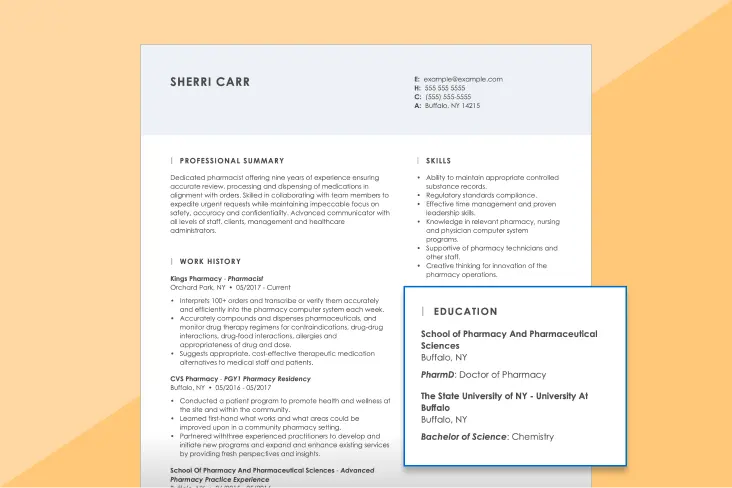How to List Education on a Resume Examples
See how to write a resume education section for every scenario, including high school students, those with incomplete degrees and college graduates. Plus, we show you where to list it on your resume!
Hired By:*


How to list education on a resume
The education section of your resume is a dedicated space to list all of your formal schooling. Its goal is to show employers that you have the education and training necessary to do the job.
Overall, the process of listing your education is always the same. You’ll list each school you attended in reverse-chronological (most recent first) order.
You need these details in each entry:
- The degree or certificate earned.
- Name of the school that you attended.
- The city/state location of the school.
- The major(s) or focus of your study.
You should include the expected graduation year if you’re working on a degree but have yet to graduate.
Here are some education section examples based on degree level:
1High school only:
- High School Diploma | George F. Baker High School | Tuxedo Park, NY
2If you graduated high school and have an associate degree, list only the associate unless you are currently attending college:
- Associate of Science: Nursing Administration – Expected in May 2025 | Fox University | Newberg, OR High School Diploma | Habersham Central High School | Mount Airy, GA
3Associate and bachelor’s:
- Bachelor of Arts: English – May 2020 | University of California – Los Angeles | Los Angeles, CA
- Associate of Arts: Communication Studies – May 2017 | Foothill College | Los Altos, CA
4Bachelor’s only:
- Bachelor of Arts: American and English Literature | Boston College | Chestnut Hill, MA
5Bachelor’s and master’s:
- Master of Science: Library And Information Science | Texas A&M University | College Station, TX
- Bachelor of Science: Library Sciences | University of Texas at Austin | Austin, TX
6Bachelor’s, master’s and Ph.D.:
- Ph.D.: Literature | Massachusetts Institute of Technology | Cambridge, MA
- Master of Arts: English Language and Literature | University of California – Santa Cruz | Santa Cruz, CA
- Bachelor of Arts: English | University of North Carolina at Chapel Hill | Chapel Hill, NC
PRO TIP
Including the year you graduated and earned your degree is optional and highly discouraged. Adding the year hints at your age, which can lead to hiring bias issues. If using ChatGPT to write your resume, ensure you remove the graduation date before submitting your job application.
Where to list education on a
resume ?
The upper portion of your resume should be dedicated to your work history, showcasing the accomplishments that align most closely with the job you’re seeking.
Ask yourself: Is your education the most pertinent accomplishment for this role?
More often than not, the answer will be no. Work experience typically holds greater significance for positions beyond entry-level jobs. In this case, education would appear at the bottom of your resume, like in the chronological format.
However, there are instances where education takes precedence.
Education should lead if you’ve recently graduated from college and lack relevant work experience.
Additionally, prioritize education over work experience if you’ve recently returned to school to pursue a degree relevant to your desired job via a functional resume format.
In the case that you’re a student preparing for college admissions, you might want to prioritize the education section when writing your college resume, especially if you have plenty of academic achievements to highlight.
For instance, if you’re transitioning to a career in human resources after completing a related program but primarily possess experience in marketing, highlighting your new education at the forefront is advisable.
PRO TIP
Exercise caution if you’re applying for an academic position and writing a CV rather than a resume. In such cases, education consistently precedes work experience.
Write your education section fast with our Resume Builder
Using our professional Resume Builder removes the guesswork of formatting your education section. It’s a tool that makes writing your resume fast, easy and flawless.
Our builder speeds up the writing process because it features 30+ resume designs you can use in all three formats!
It also has these features, helpful for the education section:
- Proper degree formatting
- Ability to add minors and academic recognitions
- Auto-populates school names and location
- Spelling and grammar check
Awards & honors section
If you lack much work experience, your education may be your best case for why you deserve a job.
So, it can be a good idea to bulk up your education history by including a special section titled “Awards & Honors.” You can list your academic achievements here to show employers you’re smart, talented and hard-working.
Some examples include:
- AP Scholar with Honors
- DoDEA AP Scholar
- International Scholarship Award
- National AP Scholar
- National Student Volunteer Award
- President’s Award for Educational Achievement
- President’s Award for Educational Excellence
- President’s National Service Award
Certifications & training section
In some cases, you may wish to include educational experience that wasn’t at a formal school or university to beef up your education section.
This may include:
- Specialized programs
- Company courses
- Relevant workshops
- Certified online or offline experience
If you earned a certification or did training, you should include it in its own section called “Certifications and Training.” Keep it separate from the more formal experience in your education section.
Here are examples of different certifications or training candidates might choose to highlight based on their education level:
1High school diploma & an internship or apprenticeship:
- Welding Technology certification
- EMT Paramedic certification
- Business Administration and Management training program
- FAA Certificate
2High school diploma and associate degree:
- Registered Nursing Certification
- Single Subject Credential
- Marketing Management certificate
3Bachelor’s only:
- Human Resources training
- HRIS technologies certification
- UX customer certification
4Bachelor’s and Masters:
- CCSP Network Security
- Novell Certified Linux Professional 10 (NCLP10)
- Certified Information System Security Professional
5Bachelor’s, Master’s and Ph.D.:
- EKG-ECG certificate
- HIPAA Compliance
- Secondary Education credential
Key takeaways
- Your education section should be positioned beneath your work experience section or at the top if you need more work experience or wish to highlight a recent degree.
- Arrange your educational entries in reverse-chronological order, starting with the most recent.
- Omit high school education if you possess a university or community college degree.
- Only list your GPA if it is exceptional.
- Tailor the format of your education section to suit the type of institution attended.
- Even if you did not complete your education, including it on your resume is acceptable.
Resume Education FAQ
Should education be at the top or bottom of a resume?
Your education section’s location depends on your experience level. Someone with a lot of work experience should list that section first, with education near the bottom of the resume. In contrast, a recent graduate or someone in the academic field would have their education section more toward the center of their resume.
How to list ongoing education on a resume?
If you are currently in an education program, note your expected graduation date. If you started a program but did not complete it and it is relevant to your industry — format the section as usual but include the phrase “some college” or “to be completed in (year).”
How to list current education on a resume?
You can format your education section with your current institution’s location, name and expected graduation date. Remember, current education and dates can be shown, but anything irrelevant or 10 years or more out of date should not be included.
Should I put my GPA on my resume?
Including your GPA can help you if you’re a recent graduate. However, for most people, it’s advised to leave your GPA off your resume.
Add your GPA to your education listing only if you meet these two points:
- It’s been under two years since you graduated. Otherwise, including your GPA may seem like bragging or hanging onto your student days.
- Your GPA is higher than 3.0. Anything less will not make a good impression, don’t include it.
How We Reviewed This Article
Over the past 15 years, we’ve helped more than 10 million job seekers build stronger cover letters, discover their career paths, interview confidently, and boost their chances of finding the right job faster. Review our Editorial Policy to learn more about our process.














